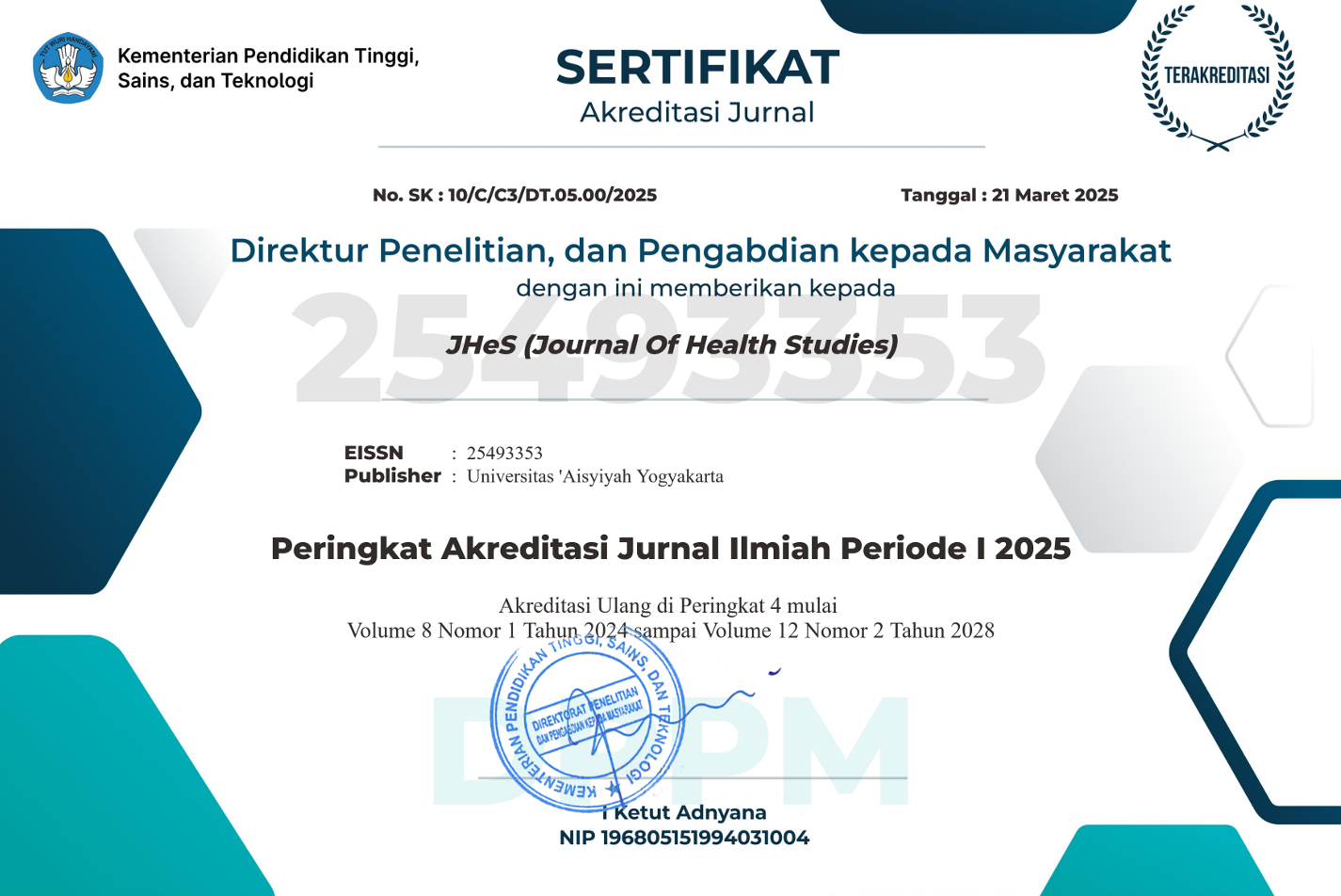Interventions strategy reducing postpartum fatigue: a literature review
DOI:
https://doi.org/10.31101/jhes.2698Abstract views 965 times
Keywords:
intervention, postnatal fatigue, postpartum fatigueAbstract
Downloads
References
Ashrafinia, F., Mirmohammadali, M., Rajabi, H., Kazemnejad, A., Sadeghniiat Haghighi, K., & Amelvalizadeh, M. (2015). Effect of Pilates exercises on postpartum maternal fatigue. Singapore Medical Journal, 56(3), 169–173. https://doi.org/10.11622/smedj.2015042
Ashrafinia, F., Mirmohammadali, M., Rajabi, H., Kazemnejad, A., Sadeghniiathaghighi, K., Amelvalizadeh, M., & Chen, H. (2014). The effects of Pilates exercise on sleep quality in postpartum women. Journal of Bodywork and Movement Therapies, 18(2), 190–199. https://doi.org/10.1016/j.jbmt.2013.09.007
Badr, H. A., & Zauszniewski, J. A. (2017). Meta-analysis of the predictive factors of postpartum fatigue. Applied Nursing Research, 36, 122–127. https://doi.org/10.1016/j.apnr.2017.06.010
Bai T., Yang Y., Fu X., Zhou Y., Wei X., & Zhang F. (2018). Analysis of the impact of postpartum fatigue on the onset of lactation. Chinese Journal of Nursing, 438–442.
Bakker, M., van der Beek, A. J., Hendriksen, I. J. M., Bruinvels, D. J., & van Poppel, M. N. M. (2014). Predictive factors of postpartum fatigue: A prospective cohort study among working women. Journal of Psychosomatic Research, 77(5), 385–390. https://doi.org/10.1016/j.jpsychores.2014.08.013
Bick, D. (2003). Strategies to Reduce Postnatal Psychological Morbidity. Disease Management & Health Outcomes, 11(1), 11–20. https://doi.org/10.2165/00115677-200311010-00003
Buttner, M. M., Mott, S. L., Pearlstein, T., Stuart, S., Zlotnick, C., & O’hara, M. W. (2013). Examination of premenstrual symptoms as a risk factor for depression in postpartum women. Archives of Women’s Mental Health, 16(3), 219–225. Research Library. https://doi.org/10.1007/s00737-012-0323-x
Chen, S.-L., & Chen, C.-H. (2015). Effects of Lavender Tea on Fatigue, Depression, and Maternal-Infant Attachment in Sleep-Disturbed Postnatal Women. Worldviews on Evidence-Based Nursing, 12(6), 370–379. https://doi.org/10.1111/wvn.12122
Cheng, C. Y., & Pickler, R. H. (2014). Perinatal Stress, Fatigue, Depressive Symptoms, and Immune Modulation in Late Pregnancy and One Month Postpartum. The Scientific World Journal, 2014, 652630. https://doi.org/10.1155/2014/652630
Choi, E., & Song, E. (2017). Efficacy of a footbath for post-partum fatigue in South Korea: A quasi-experimental study. Japan Journal of Nursing Science: JJNS, 14(2), 126–134. https://doi.org/10.1111/jjns.12143
El-Morsey, A.-S. (2019). Sleep Disturbances and Fatigue Among Women in Postnatal Period. Port Said Scientific Journal of Nursing, 6(1), 39–56. https://doi.org/10.21608/pssjn.2019.33448
Fata, S., & Atan, Ş. (2018). The Relationship between Fatigue and Breastfeeding Self‑efficacy. Nigerian Journal of Clinical Practice, 7. https://doi.org/10.4103/njcp.njcp_366_17
Giallo, R., Cooklin, A., Dunning, M., & Seymour, M. (2014). The efficacy of an intervention for the management of postpartum fatigue. Journal of Obstetric, Gynecologic, and Neonatal Nursing: JOGNN, 43(5), 598–613. https://doi.org/10.1111/1552-6909.12489
Giallo, R., Gartland, D., Woolhouse, H., & Brown, S. (2015). Differentiating maternal fatigue and depressive symptoms at six months and four years post partum: Considerations for assessment, diagnosis and intervention. Midwifery, 31(2), 316–322. https://doi.org/10.1016/j.midw.2014.09.005
Giallo, R., Gartland, D., Woolhouse, H., & Brown, S. (2016). “I didn’t know it was possible to feel that tiredâ€: Exploring the complex bidirectional associations between maternal depressive symptoms and fatigue in a prospective pregnancy cohort study. Archives of Women’s Mental Health, 19(1), 25–34. https://doi.org/10.1007/s00737-014-0494-8
Giallo, R., Rose, N., Cooklin, A., & McCormack, D. (2013). In survival mode: Mothers and fathers’ experiences of fatigue in the early parenting period. Journal of Reproductive and Infant Psychology, 31(1), 31–45. https://doi.org/10.1080/02646838.2012.751584
Giallo, R., Seymour, M., Dunning, M., Cooklin, A., Loutzenhiser, L., & McAuslan, P. (2015). Factors associated with the course of maternal fatigue across the early postpartum period. Journal of Reproductive and Infant Psychology, 33(5), 528–544. https://doi.org/10.1080/02646838.2015.1021769
Hatfield, G., Lesser, I., & Nienhuis, C. (2022). Utility of an outdoor group exercise program for improving postpartum mental health. The Health & Fitness Journal of Canada, 15(1), Article 1. https://doi.org/10.14288/hfjc.v15i1.807
Henderson, J., Alderdice, F., & Redshaw, M. (2019). Factors associated with maternal postpartum fatigue: An observationalstudy. BMJ Open, 9(7), e025927. https://doi.org/10.1136/bmjopen-2018-025927
Iwata, H., Mori, E., Sakajo, A., Aoki, K., Maehara, K., & Tamakoshi, K. (2018). Course of maternal fatigue and its associated factors during the first 6 months postpartum: A prospective cohort study. Nursing Open, 5(2), 186–196. https://doi.org/10.1002/nop2.130
Kazeminia, M., Salari, N., Shohaimi, S., Akbari, H., Khaleghi, A. A., Bazrafshan, M.-R., & Mohammadi, M. (2022). Assessing the effects of exercise on post-partum fatigue symptoms: A systematic review and meta-analysis. European Journal of Obstetrics & Gynecology and Reproductive Biology: X, 15, 100155. https://doi.org/10.1016/j.eurox.2022.100155
Ko, Y.-L., Yang, C.-L., & Chiang, L.-C. (2008). Effects of postpartum exercise program on fatigue and depression during “doing-the-month†period. The Journal of Nursing Research: JNR, 16(3), 177–186. https://doi.org/10.1097/01.jnr.0000387304.88998.0b
Kushnir, T., Israeli-Tedgi, S., & Urkin, J. (2013). Do fathers suffer from postpartum fatigue? The roles of sleep quality and stress. Sleep Medicine, 14, e175. https://doi.org/10.1016/j.sleep.2013.11.410
Lai, Y.-L., Hung, C.-H., Stocker, J., Chan, T.-F., & Liu, Y. (2015). Postpartum fatigue, baby-care activities, and maternal-infant attachment of vaginal and cesarean births following rooming-in. Applied Nursing Research: ANR, 28(2), 116–120. https://doi.org/10.1016/j.apnr.2014.08.002
McBean, A. L., & Montgomery-Downs, H. E. (2015). Diurnal fatigue patterns, sleep timing, and mental health outcomes among healthy postpartum women. Biological Research for Nursing, 17(1), 29–39. https://doi.org/10.1177/1099800414528278
Moradi, Z., Aliabadi, A., Rahdari, A., Moghaddam, F., Sanchooli, F., & Heydari, N. (2016). Slow-Stroke Back Massage Intervention for Relieving Postpartum Fatigue in Primiparous Mothers after a Natural Delivery: A Randomized Clinical Trial in Zabol. British Journal of Pharmaceutical Research, 14, 1–7. https://doi.org/10.9734/BJPR/2016/31509
Oremus, M., Wolfson, C., Perrault, A., Demers, L., Momoli, F., & Moride, Y. (2001). Interrater reliability of the modified Jadad quality scale for systematic reviews of Alzheimer’s disease drug trials. Dementia and Geriatric Cognitive Disorders, 12(3), 232–236. https://doi.org/10.1159/000051263
Ospina Romero, A. M., Muñoz de RodrÃguez, L., & Ruiz de Cárdenas, C. H. (2012). Coping and Adaptation Process during Puerperium. Colombia Médica, 43(2), 167–174.
Pardell-Dominguez, L., Palmieri, P. A., Dominguez-Cancino, K. A., Camacho-Rodriguez, D. E., Edwards, J. E., Watson, J., & Leyva-Moral, J. M. (2021). The meaning of postpartum sexual health for women living in Spain: A phenomenological inquiry. BMC Pregnancy and Childbirth, 21(1), 92. https://doi.org/10.1186/s12884-021-03578-y
Parks, P. L., Lenz, E. R., Milligan, R. A., & Han, H. R. (1999). What happens when fatigue lingers for 18 months after delivery? Journal of Obstetric, Gynecologic, and Neonatal Nursing: JOGNN, 28(1), 87–93. https://doi.org/10.1111/j.1552-6909.1999.tb01969.x
Rouhi, M., Mohammad-Alizadeh, S., Yousefi, H., & Rouhi, N. (2011). Postpartum morbidity and help-seeking behaviours in Iran. British Journal of Midwifery, 19, 178–184. https://doi.org/10.12968/bjom.2011.19.3.178
Senol, D. K., Yurdakul, M., & Ozkan, S. A. (2019). The effect of maternal fatigue on breastfeeding. Nigerian Journal of Clinical Practice, 22(12), 1662–1668. https://doi.org/10.4103/njcp.njcp_576_18
Sinai, D., & Tikotzky, L. (2012). Infant sleep, parental sleep and parenting stress in families of mothers on maternity leave and in families of working mothers. Infant Behavior & Development, 35(2), 179–186. https://doi.org/10.1016/j.infbeh.2012.01.006
Taylor, J., & Johnson, M. (2013). The role of anxiety and other factors in predicting postnatal fatigue: From birth to 6 months. Midwifery, 29(5), 526–534. https://doi.org/10.1016/j.midw.2012.04.011
Timlin, D., & Simpson, E. E. A. (2017). A preliminary randomised control trial of the effects of Dru yoga on psychological well-being in Northern Irish first time mothers. Midwifery, 46, 29–36. https://doi.org/10.1016/j.midw.2017.01.005
Vatwani, A., & Margonis, R. (2019). Energy Conservation Techniques to Decrease Fatigue. Archives of Physical Medicine and Rehabilitation, 100(6), 1193–1196. https://doi.org/10.1016/j.apmr.2019.01.005
Vaziri, F., Shiravani, M., Najib, F. S., Pourahmad, S., Salehi, A., & Yazdanpanahi, Z. (2017). Effect of Lavender Oil Aroma in the Early Hours of Postpartum Period on Maternal Pains, Fatigue, and Mood: A Randomized Clinical Trial. International Journal of Preventive Medicine, 8, 29. https://doi.org/10.4103/ijpvm.IJPVM_137_16
Wilson, N., Lee, J. J., & Bei, B. (2019). Postpartum fatigue and depression: A systematic review and meta-analysis. Journal of Affective Disorders, 246, 224–233. https://doi.org/10.1016/j.jad.2018.12.032
Wilson, N., Wynter, K., Fisher, J., & Bei, B. (2018). Related but different: Distinguishing postpartum depression and fatigue among women seeking help for unsettled infant behaviours. BMC Psychiatry, 18, 309. https://doi.org/10.1186/s12888-018-1892-7
Yang, C.-L., & Chen, C.-H. (2018). Effectiveness of aerobic gymnastic exercise on stress, fatigue, and sleep quality during postpartum: A pilot randomized controlled trial. International Journal of Nursing Studies, 77, 1–7. https://doi.org/10.1016/j.ijnurstu.2017.09.009
Yee, L. M., Kaimal, A. J., Nakagawa, S., Houston, K., & Kuppermann, M. (2013). Predictors of postpartum sexual activity and function in a diverse population of women. Journal of Midwifery & Women’s Health, 58(6), 654–661. https://doi.org/10.1111/jmwh.12068
Zhang, F., Xue, Q., Bai, T., Wu, F., & Yan, S. (2022). Postpartum Fatigue and Inhibited Lactation. Biological Research For Nursing, 24(1), 128–139. https://doi.org/10.1177/10998004211050047
Downloads
Published
Issue
Section
License
With the receipt of the article by the Journal of Health Studies Editorial Board and the decision to be published, then the copyright regarding the article will be diverted to Journal of Health Studies. Universitas 'Aisyiyah Yogyakarta as the publisher of Journal of Health Studies hold the copyright regarding all the published articles in this journal.
Journal of Health Studies is licensed under a Creative Commons Attribution-ShareAlike 4.0 International License.













